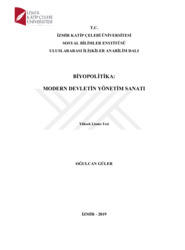Biyopolitika : Modern devletin yönetim sanatı
-
Eser Sahibi
Oğulcan Güler
- Tez Danışmanı Nihal Kırkpınar Özsoy
-
Tür
Yüksek Lisans
- Yayın Tarihi 2019
-
Yayıncı
İzmir Katip Çelebi Üniversitesi Sosyal Bilimler Enstitüsü
- Tek Biçim Adres https://hdl.handle.net/11469/3089
- Konu Başlıkları Biyopolitika
ÖZETBiyopolitika iktidarın yaşam üzerindeki denetim ve düzenleme pratiklerini işaret etmektedir. Dolayısıyla kavram kürtaj, karantina, doğum kontrol yöntemleri gibi tıbbi uygulamalardan makro düzeydeki nüfus politikalarına kadar birçok farklı uygulamayı açıklamak için kullanılagelmiştir. Söz konusu denetim ve düzenleme teknikleri bireyler üzerine değil biyolojik bağlamda insana ve nüfus üzerine uygulanmaktadır. Bu teknikler ile de nüfusun ve insan türünün kapasitesini arttırmak hedeflemektedir. Tıp, biyoloji ve modern teknolojinin gelişmesi ile biyopolitikanın kapsadığı alan her geçen gün daha da genişlemektedir. Bugüne kadar biyopolitika üzerine birçok farklı yazar çalışma yapmış ve bu da kavramın işaret ettiği alanı daha da genişletmiştir. Ancak söz konusu çalışmalarda biyopolitikanın modern devlet ile olan ilişkisine ve uluslararası boyutuna neredeyse hiç yer verilmemiştir. Bu nedenle elinizdeki tez çalışmasının amacı öncelikle biyopolitikayı ele alan farklı yazarların kavrama dair görüşlerini bir araya toplamak ve kavrama dair genel bir çerçeve çizmek, ardından da biyopolitikanın modern devlet ile olan ilişkisini ve kesişim noktalarını ortaya koymaktır. Çalışmada varılan sonuç ise biyopolitika ile modern devletin birbirinden bağımsız bir şekilde var olamayacağı ve biyopolitikanın modern devletler bağlamında uluslararası bir boyutunun da olduğudur.ABSTRACTBiopolitcs refers to supervision and regulation practices of the power over the life. Hence, it is being used to explain many concepts ranging from the medical applications of abortion, quarantine and the contraception methods, to the macro-level population policies. The aforementioned regulation and supervision methods are not applied to the individuals. Instead, they are applied to the humankind in biological context and to the population in general. These methods are used with the intention of increasing the capability of the population and the humankind. Due to the advances in medicine, biology and the modern technology, the extent of biopolitcs continously expands. Moreover, the vast amount of studies conducted in this field also expands the definition of the biopolitcs further. However, the international aspect of the biopolitics and its relationship with the modern state are hardly ever included in those studies. Therefore, this thesis study is intended to bring the studies of different authors together with the aim of setting the general framework first, and then to present the relationship of biopolitics with the modern state. The conclusion of this study shows that the biopolitcs and the modern state cannot exist independently, and there is an international aspect of biopolitics in the context of modern states.
-
Koleksiyonlar
ENSTİTÜLER
SOSYAL BİLİMLER ENSTİTÜSÜ

 Tam Metin
Tam Metin

